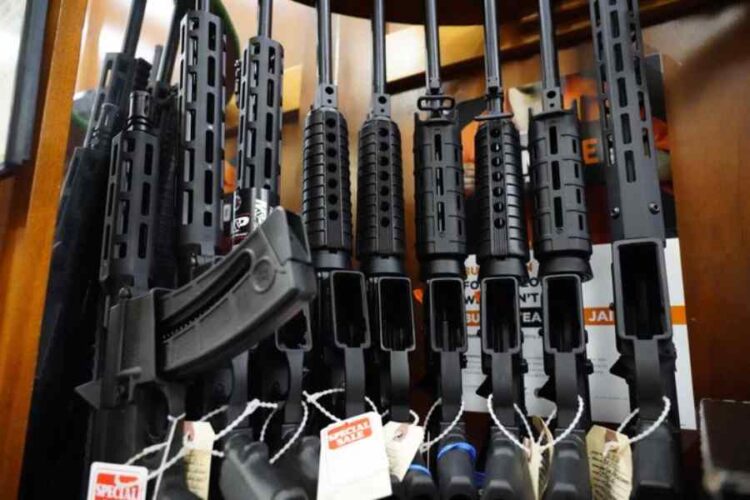Since its enactment in 2005, the Protection of Lawful Commerce in Arms Act (PLCAA) has served as a formidable legal shield for gun manufacturers, insulating them from liability arising from the criminal misuse of their firearms.
This piece of legislation was designed to protect the firearms industry from potentially crippling legal battles that could arise if companies were held liable for actions perpetrated with their products.
As a result, the PLCAA has been instrumental in the industry’s ability to operate without the looming threat of lawsuits for damages caused by their wares, thus ensuring its stability and continued growth.
However, the winds of change began to stir with a pivotal ruling from the Connecticut Supreme Court about the tragic Sandy Hook Elementary School shooting.
This ruling challenged the seemingly impenetrable defense offered by the PLCAA, suggesting a crack in the legal armor that had protected gun manufacturers for over a decade.
The court’s decision to allow the families of Sandy Hook victims to proceed with their lawsuit against Remington Arms, the manufacturer of the rifle used in the shooting, has marked a significant moment in the ongoing debate over gun control and manufacturer liability.
This development hints at the possibility of a new legal landscape where the protections afforded by the PLCAA might not be as absolute as previously thought, opening the door to further scrutiny and potentially reshaping the relationship between gun manufacturers and the communities impacted by gun violence.
The Sandy Hook Decision
The Sandy Hook decision by the Connecticut Supreme Court represents a seminal shift in the legal battles surrounding gun manufacturer liability. On March 14, the court ruled favorably on an appeal by the families of the victims of the Sandy Hook Elementary shooting, allowing them to pursue their lawsuit against Remington Arms, the manufacturer of the Bushmaster XM15-E2S rifle used in the 2012 tragedy.
This decision reversed a lower court’s ruling that had dismissed the lawsuit based on the protections afforded by the Protection of Lawful Commerce in Arms Act (PLCAA).
Central to the court’s decision was the interpretation of a PLCAA exception that permits litigation against gun manufacturers if they knowingly violate a state or federal statute applicable to the sale or marketing of firearms.
The families argued, and the court agreed, that Remington’s marketing practices were not just unethical but unlawful under Connecticut’s unfair trade practices law.
They contended that Remington had marketed the rifle as a weapon of war, glorifying its military features and appeal to a combat-style mentality, which is pitched at civilians with the implicit message of taking on perceived enemies.
This type of marketing was claimed to be predatory and directed towards vulnerable consumers, including young men who are often drawn to such military themes.
This broad interpretation of “applicable” laws under the PLCAA by the Connecticut Supreme Court has opened a new avenue for litigation, setting a precedent that could potentially unleash a wave of lawsuits against the firearms industry.
The decision underscores a growing judicial willingness to reexamine long-held legal protections for gun manufacturers, particularly under the scrutiny of state consumer protection laws and their applicability to firearms marketing and sales practices.
The ramifications of this ruling are profound, as it not only challenges the legal immunities traditionally enjoyed by gun manufacturers but also ignites a significant conversation on the ethical responsibilities of these companies in their marketing strategies.
Legal Grounds of the Ruling
The crux of the Sandy Hook families’ argument was an exception within the PLCAA itself, which allows for litigation against manufacturers who violate state or federal statutes applicable to the sale or marketing of firearms. The families alleged that Remington’s marketing strategy glamorized the militaristic characteristics of the rifle and promoted its use for offensive combat operations, effectively appealing to the sense of power and tactical superiority among potential buyers. This, they claimed, constituted a violation of Connecticut’s unfair trade practices law—a statute they argued was “applicable” to firearm marketing.
Implications of the ‘Applicable’ Statute
The Connecticut Supreme Court’s agreement with the families hinged on their broad interpretation of the term “applicable.” The court stated that for a statute to be applicable, it did not need to specifically pertain to firearms.
Instead, any state or federal law that could be applied to the marketing or sale practices of firearms, such as the unfair trade practices law, would suffice. This interpretation marks a significant departure from previous narrower readings and sets a precedent that could impact future litigation.
Potential National Repercussions
The decision has potentially set the stage for a new wave of lawsuits across the United States. Similar claims may now be more likely to survive the initial stages of litigation if plaintiffs can successfully argue that gun manufacturers’ marketing practices violate broadly applicable state consumer protection laws. This could lead to a substantial increase in the legal challenges faced by the firearms industry.
The future of this legal battle is poised to reach the U.S. Supreme Court. The national implications of the Connecticut ruling could prompt a swift appeal, with the highest court in the land required to make a definitive interpretation of “applicable” within the context of the PLCAA.
The outcome will either solidify the current legal protections afforded to gun manufacturers or reshape the foundational legal precedents governing firearm litigation.
The ruling has been met with mixed reactions. Gun control advocates view it as a crucial step forward in holding manufacturers accountable for the societal impacts of their products, particularly in cases where marketing strategies are alleged to target impressionable and at-risk demographics.
Conversely, gun rights supporters and industry representatives argue that this decision could lead to unjustified and economically damaging lawsuits based on tenuous associations between marketing materials and criminal actions.
For the gun industry, the stakes are high. A surge in lawsuits could lead to significant financial liabilities and force companies to reevaluate their marketing strategies drastically.
More broadly, this could influence public and political perceptions of the industry, potentially accelerating legislative changes aimed at increasing manufacturer accountability.
As the case progresses to the U.S. Supreme Court, all eyes will be on the potential for legal reinterpretations that could strip away the near-immunity gun manufacturers have enjoyed under the PLCAA.
This case not only challenges the legal boundaries of the Act but also tests the waters for how far states can go in regulating the firearms industry through consumer protection laws and other statutory mechanisms.
The Sandy Hook lawsuit represents more than just a legal challenge; it is a pivotal moment that could transform the legal landscape surrounding gun manufacturing and accountability.
Whether this will lead to a tightening of regulations or a reaffirmation of the status quo remains to be seen.
However, one thing is clear: the implications of this decision will resonate through the legal system, the gun industry, and society at large for years to come.
As the battle lines are drawn, the Sandy Hook decision may either be seen as the beginning of a new era of accountability for gun manufacturers or a reaffirmation of their legal protections. Either outcome will significantly impact the dialogue surrounding gun violence and public safety in America.
The eventual decision by the U.S. Supreme Court will likely serve as a landmark in the evolution of gun law and policy in the United States, setting precedents that will influence court decisions long into the future.










